#Mario Florescu
Explore tagged Tumblr posts
Text
Antrenorul Ionuț Puca pregateste un nou lot de sportivi pentru Gala Urban Legend
Antrenorul Ionuț Puca pregateste un nou lot de sportivi pentru Gala Urban Legend
Un nou lot de sportivi este, aruncat” pe piata sporturilor de contact de catre antrenorul Ionut Puca in gala profesionista Urban Legend organizata de promoteurul Isop Mihai, la Constanta pe 11 noiembrie! In cadrul galei Urban Legend vor lupta Mario Florescu, Sandu Cristian, Enzo Minca si noul sportiv adus in echipa sub contract, Andrei Patru. “Scopul nostru este sa creem o echipa puternica de 10…
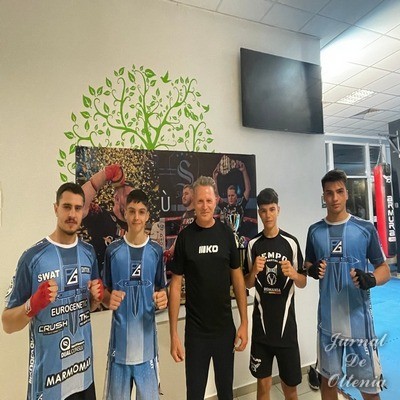
View On WordPress
#11 noiembrie#Andrei Patru#Constanta#Enzo Minca#ionut puca#Isop Mihai#kempo#KickBoxing#Mario Florescu#power gym#Power Gym Craiova#Sandu Cristian
0 notes
Text
FOMA 16: Romanian Coastland
FOMA goes back to Romania. Miruna Dunu is exploring the seaside architecture on the Romanian Black Sea coast. She is passionate about collecting postcards that brought her to the investigation of the complex case study of the socialist leisure facilities between 1960s and 1980s. Her Forgotten Masterpieces are revealing the vast political mechanism, the social discrimination and the hyper real narrative of the seaside holiday architecture, the forgotten promised paradise.
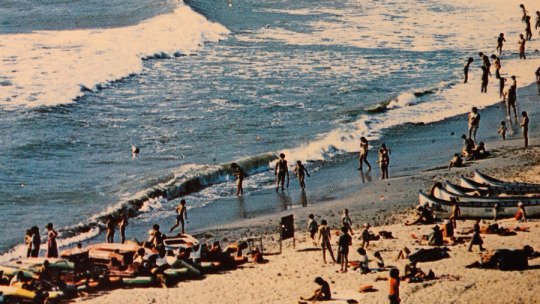
Venus resort beach. | Postcard author’s collection, photo by Hedy Löffler, 1980
Historically a privilege of the aristocracy, leisure only became accessible to the masses in the 20th Century. In the particular case of seaside leisure, it was a gradual process that combined ideological aspects on the one hand, such as health pursuits and the creation of the modern man, and more practical considerations on the other hand, like the new work patterns imposed by the Industrial Revolution. Furthermore, with a working class already on the rise before WW2, state policies for paid workers’ holidays drove leisure and its associated architecture one step further.
Making no exception to the established trends, the basis of the Romanian seaside leisure was laid with the emergence of the first treatment facilities in the late 19th Century. In the early 1900s, the first beach cabins appear together with a wooden pavilion of Victorian inspiration, in the old fisherman’s village of Mamaia.
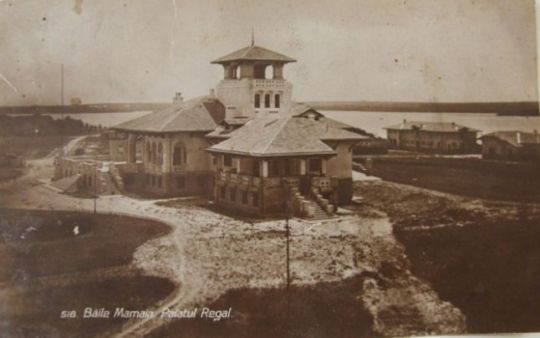
Royal Palace of Mamaia by Mario Stoppa. | Image via adevarul.ro
The inter-war period marked a significant increase in the emergence of seaside facilities. Once reserved for the wealthy few or merely a contemplative retreat for romantic flâneurs, the coastal area became a popular destination for fashionable activities like water sports and sun-bathing. The architecture would reflect the novel lifestyle, turning into a breeding ground for spatial experiments and typologies that would hardly belong to the urban setting.
Despite the gradual and relative democratisation of the seaside developments, the aristocracy’s traditional access to the coastal retreat facilities remained prominent, especially in the 1920s. A notable architectural addition of the time is the Royal Palace of Mamaia, completed in 1926. Commissioned by the Romanian royal family, the Neo-Romanian style villa situated in the proximity of the beach is designed by Italian architect Mario Stoppa and consists of lower horizontal volumes with terraces and a watchtower as the main vertical element. The design cleverly combines vernacular elements and textures with the latest technological developments of the time, such as central heating and air conditioning. Unlike the cubist buildings that would become increasingly popular on the coast, the Royal Palace of Mamaia pays homage to the local traditions of the building crafts, exploring the specific architectural expressions of the area.
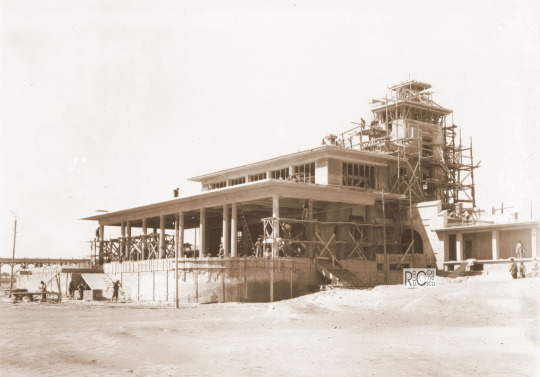
Mamaia Casino under construction in 1934. | Image Radu Cornescu
With the concept of free time on the rise, it wasn’t long before radical spatial experiments appeared on the seaside, driven by both the trends of the latest architectural discourse and the necessities of the new leisure activities. Modernist villas displaying pure geometric structures, unconventionally-shaped bungalows and steamboat-like hotels radically transformed the urban fabric of the resorts, equally reflecting the architects’ and the public’s interest in the contemporary European tendencies. The rising number of tourists stimulated further investments in the seaside’s infrastructure and development. The mid-1930s saw the inauguration of an Art Deco style Casino right at the heart of Mamaia resort. Designed by architect Victor G. Ștephănescu, the building was hosting a restaurant, a dancehall, shops, a police office, telephone booths and the manager’s private suite. Additional beach cabins and a concrete pier with slides, two wharfs for small boats and a terrace-bar at its very end completed the ensemble. The Mamaia Casino complex readily became one of the main attractions on the Romanian coast, hosting thousands of local and foreign visitors each year.
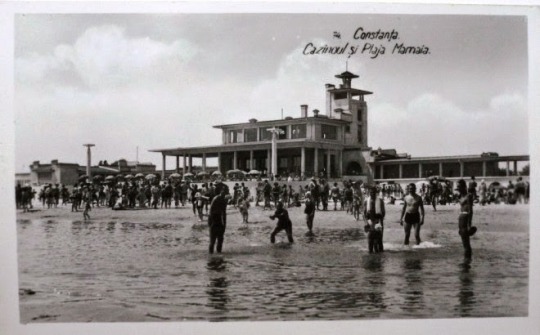
A crowded day at the beach in the late 1930s. | Postcard via radiovacanta.ro
The abrupt transition to communism in the post-war period brought a fundamentally different approach to leisure policies, thus pushing the spatial production in a different direction. Implemented in two stages, the socialist seaside project drove beach tourism to an unprecedented scale.
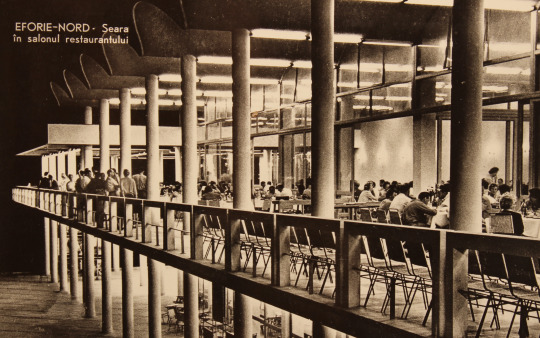
The vibrant atmosphere on the terrace of the restaurant club Neon in 1957. | Postcard author’s collection, unknown photographer, 1963
The first phase, spanning from 1955 to 1965, focused on leisure as a hygienic retreat, the spatial production consequently reflecting this through the low-rise hotels and spas. Following the international trends, the buildings integrate a functionalist modernist aesthetic achieved through the use of glass, concrete and steel. A notable level of architectural experimentation was involved in the design of clubs and restaurants such as Neon. Elevated on elegant concrete pillars, the attention to detail is visible through the bespoke design of the balustrades, floor-tiling and concrete shell roof.
While the first phase intensified the construction of amenities in existing beach towns, the second phase of the seaside development consisted of erecting a series of resorts ex-nihilo. Fuelled by both the public success of the first stage and an extended political agenda aimed at attracting foreign tourists, the architecture and urban planning of the new resorts confidently incorporate the augmented scale.
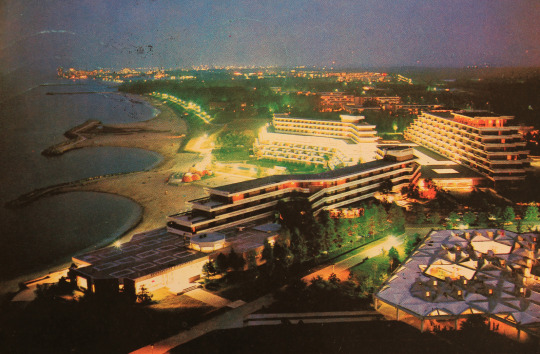
The “futuristic” silhouette of the Amfiteatru-Belvedere-Panoramic ensemble at night, Olimp (1971-1972). | Postcard author’s collection, Al. Florescu, 1974
The environmental impact of this massive intervention is not to be underplayed, with nature being shaped and enhanced in order to fit the ambitious vision of the architects. The cliffs were carved, a rich natural forest was in part cut down and artificial lakes completed a highly engineered landscape. However, architects strived to incorporate the natural features of the site into their designs. Although the resorts were in certain cases filled with standard boxy high- and low-rise hotels following the same blueprints, two developments stand out for their tailored response to the site conditions. The Amfiteatru-Belvedere-Panoramic ensemble integrates public spaces and other loisir amenities within the actual hotel buildings, merging vertical and horizontal circulation through a series of terraces and wide flights of stairs.
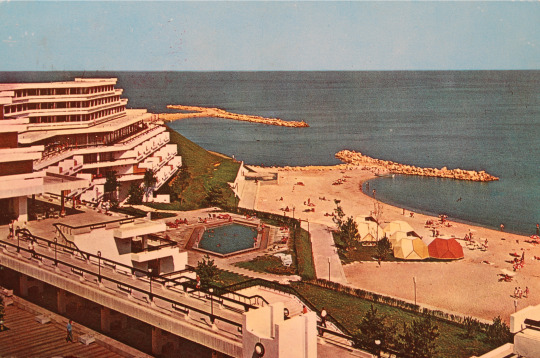
Spectacular views from every angle of Amfiteatru-Belvedere-Panoramic. | Postcard from author’s collection, photo by Al. Florescu, 1974
The Aurora resort consists of a series of hotels with a distinctive silhouette that merges modernist pure geometric shapes with organic angulations and layouts that create semi-enclosed spaces filled with vegetation. The architects’ interest in the contemporary (western) discourse becomes apparent in these interventions and echoes Romania’s relative political openness of the early 1970’s. The construction pace slowed down with the last additions to the socialist coastal development made in the late 1970s. The austerity of the following decade entailed a significant cut down on the state funding for the seaside tourism. Today, a vast majority of the socialist buildings are still standing and largely operated, be them poorly maintained or carefully refurbished. However, the chaotic privatisation policies following the communist downfall resulted in a fragmented landscape that renders the modernist-inspiration layout almost illegible.
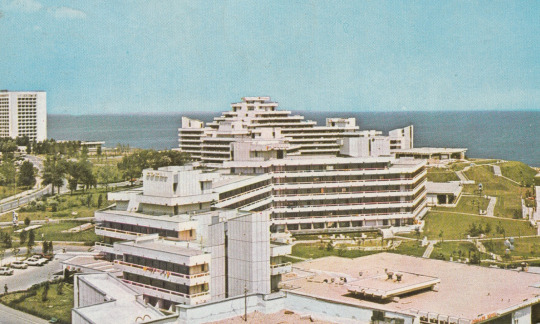
The distinctive silhouette of the hotels in Aurora resort (1972). | Postcard via sanuuitam.blogspot.ro, photographer C. Vladu, 1975
Although benefitting from a superior architectural quality when compared to the mass housing developments across the country, the seaside project consistently acted as a microcosm reflecting though its spatiality the broader Romanian socio-political reality, from cultural experimentation and dictatorial control to turbulent transition to free-market economy. In this sense, it is a typical example of how an exceptional sample can paint a rather accurate picture of the whole, if looked at in all its complexity.
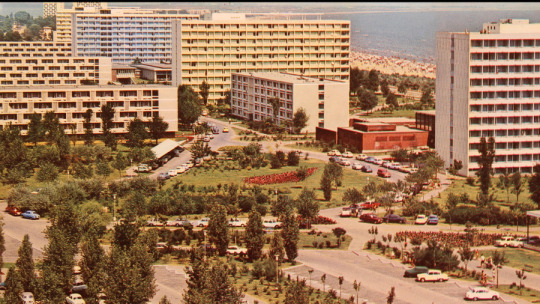
A development of an unprecedented scale in Mamaia resort | Postcard from the author’s collection, photographer D. Bădescu, 1970
___
Notes
Popescu, C. (2014). An Effective Mechanic: the Romanian Seaside in the Socialist Period
#FOMA 16: Miruna Dunu
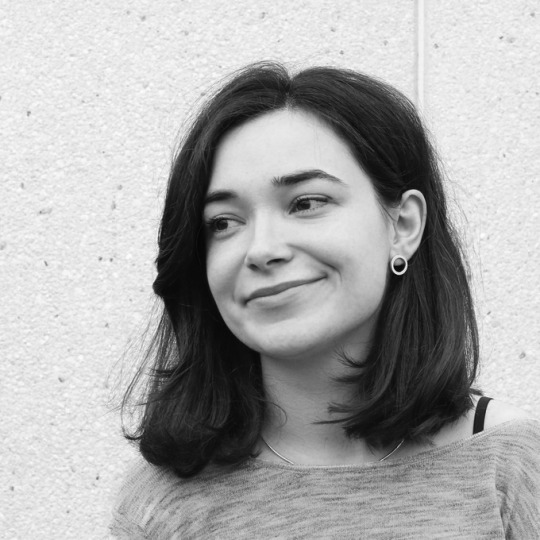
Miruna Dunu is a visual designer with an architectural background. She graduated with a Bachelor degree in Architecture (2013) with First Class Honours from the University of Manchester, United Kingdom, and a Master of Arts in Information Design (2017) from the Design Academy Eindhoven, Netherlands. She worked in architecture and in theatre, both fields greatly influencing her work. She expressed her passion for space and visuality through her first film Coastland.
51 notes
·
View notes
Text
PNL: LISTELE DE CANDIDAȚI pentru alegerea Consiliului JUDEȚEAN al JUDEȚULUI DOLJ și Consiliului Local Craiova, din data de 27 septembrie 2020
LISTA DE CANDIDAȚI
pentru alegerea Consiliului Local al MUNICIPIULUI CRAIOVA, județul DOLJ,
din data de 27 septembrie 2020
Nr. crt. Nume Prenume 1. GIUGEA NICOLAE 2. OPREA MARIO-OVIDIU 3. UNGUREANU ADRIANA 4. CORÂȚU COSMIN ION 5. VASILE MARIAN 6. DIACONU DAN 7. ENESCU GEORGEL 8. SIROP FLAVIUS ADRIAN 9. SAS TEODOR NICUȘOR 10. DIACONU RĂZVAN CRISTIAN 11. STOIAN DANIEL 12. VOICINOVSCHI MĂDĂLIN ROMEO 13. FLORESCU MARINEL 14. STĂNESCU CONSTANTIN 15. ZAHARIE OANA LAVINIA 16.
SPIRIDON
OVIDIU DUMITRU 17.
IONESCU AVRAM
LUCIANA MĂDĂLINA 18. NOVAC CĂTĂLIN 19. RADU MARIAN RĂZVAN 20. TUDORACHE TATIAN 21. MUNTEANU ION 22. BUȚĂ CONSTANTIN 23. URDĂ CORINA 24. PARASCHIV DANIEL 25. GRIGORIE ION DANIEL 26.
DIACONEASA
MIHAI BOGDAN 27. ȚÎȘTEA CLAUDIA IOANA 28. TĂNASE CRISTINEL 29. ȘARPE ANDREEA LAURA 30. ȘANDRU MIRELA DANIELA 31. MIREA MIHAI CONSTANTIN 32. ȘTIRBU INGRYD ILEANA 33. CIOCAZAN TATIANA 34. STĂNICĂ ȘTEFĂNIȚĂ CIPRIAN
PARTIDUL NAȚIONAL LIBERAL
LISTA DE CANDIDAȚI pentru alegerea Consiliului JUDEȚEAN al JUDEȚULUI DOLJ,
din data de 27 septembrie 2020
Nr. crt. Nume Prenume 1 GÎDĂR ALEXANDRU 2 JIANU MIHAELA ROXANA 3 TRIȚĂ DAN-ALEXANDRU 4 PĂSCULESCU VETA 5 IRINEI MARIAN- IOAN 6 FIRICĂ MIHAI 7 IVANOVICI LAURENȚIU 8 CĂLIN COSMIN- PETRUȚ 9 DRÎGNEI DANIEL 10 GĂTEJESCU ALEXANDRU-FLORIAN 11 SOARE MIHAI 12 LUICĂ DOREL 13 TRANDAFIR ȘTEFAN-CRISTIAN 14 MĂRGĂRIT DORIN-CONSTANTIN 15 MARCINSCHI-MOANȚĂ ADRIANA-LORENA 16 BADEA MARIAN 17 ȘTEFAN CLAUDIU-RĂZVAN 18 SAS TEODOR-NICUȘOR 19 IOVAN SILVIU-MARIAN 20 CRĂCIUNOIU-DUȚĂ CLAUDIU DORU 21 COVEI BOGDAN-CRISTIAN 22 NICOLAE GABRIEL 23 OLARU NICOLAE 24 IANCU DIANA-VALY 25 CARAȘ ALINA-ANDREEA 26 CÂPLEA DORU 27 MOTOI NICHI-SILVIU 28 SDREALĂ MIHAI -MARIAN 29 MUNTEANU ION 30 CATALINA IONUȚ 31 POPESCU FLAVIAN-RODIN 32 ANGHEL OVIDIU-PETRIȘOR 33 BOBEICĂ LAURENȚIU-FLORIAN 34 BREZNICEANU ALEXANDRU-COSMIN 35 MITRICĂ CRISTIAN 36 TOMA AURELIAN 37 ION DANIEL-ALEXANDRU 38 POPA ANIȘOARA 39 MARINESCU ADRIAN-COSTIN 40 VĂCĂRESCU-NEGREA LEONTINA 41 ROIBU MIHAIL 42 GÂTAN MARIUS ALEXANDRU 43 MITREA LAURENȚIU 44 NEGREA VALENTINA 45 PĂIANU LIVIU-IONUȚ
0 notes
Text
国际超现实主义十年展 在葡萄牙等你
葡萄牙科英布拉,菲盖拉·达·福斯-国际超现实主义展览,将于2020年4月24日至7月26日在葡萄牙菲盖拉·达·福斯市艺术与眼镜中心(CAE)开幕。本次展览是以庆祝和纪念10周年为宗旨,也是第14届 “现代国际超现实主义”展览。 该展览是由葡萄牙超现实主义艺术家 Santiago Ribeiro 先生创建的项目,始于2010年在科英布拉的Bissaya Barreto 基金会。 在这十年中,从里斯本到波尔图的全国各地巡回演出,以及美国的卫星展览,例如达拉斯,洛杉矶,密西西比大学和纽约,以及欧洲的柏林,巴黎和马德里 ,都是由 Santiago Ribeiro 先生一直在推广和组织。
该展览已成为全球21世纪最大的超现实主义展览,包括绘画,素描,数字艺术,雕塑和摄影作品。 展览将有来自52个国家/地区的124位参与者艺术家:阿尔巴尼亚,阿尔及利亚,阿根廷,澳大利亚,奥地利,阿塞拜疆,白俄罗斯,比利时,巴西,加拿大,智利,中国,哥伦比亚,克罗地亚,捷克共和国,古巴,丹麦,芬兰���法国,德国,匈牙利, 冰岛,印度尼西亚,伊朗,爱尔兰,以色列,意大利,日本,拉脱维亚,墨西哥,摩洛哥,荷兰,新西兰,尼日利亚,秘鲁,菲律宾,波兰,葡萄牙,罗马尼亚,俄罗斯,塞尔维亚,斯洛文尼亚,西班牙,瑞典,瑞士,土耳其 ,英国,美国,乌克兰,委内瑞拉,越南,印度。
Santiago Ribeiro 先生是21世纪全球最大的超现实主义展览的指导者和发起者,他已经在全世界包括柏林、莫斯科、纽约、达拉斯、洛杉矶、密西西比、华沙、圣彼得堡、南特、巴黎、伦敦、北京、佛罗伦萨、马德里、格拉纳达等地,以及巴塞罗那、里斯本、贝尔格莱德、黑山、罗马尼亚、日本、台湾、巴西、明斯克,新德里和卡塔吉隆在西西里和葡萄牙的许多城市,都有很多展览,目前正在南印第安纳大学的新和谐画廊展出他的艺术作品,并于1月底在丹佛举行的最大的数学会议上,在科罗拉多会议中心D厅举行的数字艺术展上展出他的艺术作品。
艺术和表演艺术中心(CAE)于2002年开放。大型文化建筑(2200座和800座礼堂-室外圆形剧场、门厅、会议室、工作室、4个展览厅),被认为是欧洲共同体基金的中心,通常举办大型国家和国际展览,同时还有其它活动。http://cae.pt/
参展艺术家的姓名如下:
Achraf Baznani, 摩洛哥 / Agim Meta, 阿尔巴尼亚-西班牙 / Aissa Mammasse, 阿尔及利亚 / Alessio Serpetti, 意大利 / Alvaro Mejias, 委內瑞拉 / Ana Neamu, 罗马尼亚 / Ana Pilar Morales, 西班牙 / Andrew Baines, 澳大利亚 / Asier Guerrero Rico (Dio), 西班牙 / Axel Blotevogel, 德国 / Brigid Marlin, 英国 / Bien Banez,菲律宾 / Can Emed, 土耳其 / Carlos Sablón, 古巴/ Cătălin Precup, 罗马尼亚 / 庄志辉, 中国台湾 / Cristian Townsend, 澳大利亚 / Conor Walton, 爱尔兰 / Cynthia Tom, 中国 / 美国 / Dag Samsund, 丹麦 / Daila Lupo, 意大利 / Dan Neamu,罗马尼亚 / Daniel Chiriac,罗马尼亚 / Daniel Hanequand, 法国 / 加拿大 / Daniele Gori, 意大利 / Delphine Cencig, 法国 / Dean Fleming, 美国 / Domen Lo, 斯洛文尼亚 / Edgar Invoker, 俄罗斯/ Efrat Cybulkiewicz, 委内瑞拉 / Egill Eibsen, 冰岛 / Erik Heyninck, 比利时 / Ettore Aldo Del Vigo, 意大利 / Fabrizio Riccardi, 意大利 / Farhad Jafari, 伊朗 / France Garrido, 美国 / Francisco Urbano, 葡萄牙 / Gabriele Esau,德国 / Genesis Cabrera, 美国 / Graça Bordalo Pinheiro, 葡萄牙 / Graszka Paulska, 波兰 / Gromyko Semper, 菲律宾 / Gyuri Lohmuller, 罗马尼亚 / Hector Pineda, 墨西哥 / Hector Toro, 哥伦比亚 / Henrietta Kozica,瑞典 / Hugues Gillet, 法国 / Isabel Meyrelles, 葡萄牙 / Iwasaki Nagi, 日本 / James Skelton, 英国/ Jay Garfinkle, 美国 / Jay Paul Vonkoffler,美国 / 阿根廷 / Jimah St, 尼日利亚 / Joanna Budzyńska-Sycz, 波兰 / João Duarte, 葡萄牙 / Keith Wigdor, 美国/ Leo Wijnhoven,荷兰 / Leo Plaw, 德国 / Liba WS, 法国 / Lubomír Štícha,捷克共和国 / Ludgero Rolo, 葡萄牙 / 吕上, 中国 / Maarten Vet, 荷兰 / Maciej Hoffman, 波兰 / Magi Calhoun, 美国 / Marnie Pitts, 英国 / Maria Aristova, 俄罗斯 / Mario Devcic,克罗地亚 / Martina Hoffman,德国 / Mathias Böhm, 德国 / Mehriban Efendi, 阿塞拜疆 / Naiker Roman, 古巴 / 西班牙 / Nazareno Stanislau, 巴西 / Nikolina Petolas, 克罗地亚 / Octavian Florescu, 加拿大 / Ofelia Hutul, 罗马尼亚 / Oleg Korolev, 俄罗斯 / Olesya Novik, 俄罗斯 / Olga Spiegel, 美国 / Otto Rapp, 奥地利 / Paula Rosa, 葡萄牙 / Paulo Cunha, 加拿大 / Pavlina Boroshova,瑞士-德国 / Pedro Diaz Cartes, 智利 / Penny Golledge, 英国 / Peter MC LANE, 法国 / Philippe Pelletier, 法国 / Radhika Menon,印度 / Richard Shannon, 美国 / Roch Fautch, 美国 / Rodica Miller, 美国 / Ruben Cukier, 阿根廷 /以色列 / Rudolf Boelee, 新西兰 / Russbelt Guerra,米鲁 / Sabina Nore, 奥地利 / Sampo Kaikkonen, 芬兰 / Santiago Ribeiro, 葡萄牙 / Sarah Zambiasi,澳大利亚 / Serge Sunne,拉脱维亚 / Sergey Tyukanov, 俄罗斯 / Shahla Rosa, 美国 / Shoji Tanaka, 日本 / 单竹兰, 中国 / Shia Weltenmenge, 德国 / Sio Shisio,印尼 / Slavko Krunic,塞尔维亚 / Sônia Menna Barreto, 巴西 / Steve Smith, 美国 / Stuart Griggs, 英国 / Svetlana Kislyachenko,乌克兰 / Svetlana Ratova, 俄罗斯 / Tatomir Pitariu, 美国 / Tersanszki Cornelia, 罗马尼亚 / Tim Roosen,比利时 / Ton Haring, 荷兰 / Victor Lages, 葡萄牙 / Vu Huyen Thuong, 越南 / Yamal Din, 摩洛哥 /西班牙/ 杨素敏, 中国台湾 / Yuliya Patotskaya, 白俄罗斯 / Yuri Tsvetaev, 俄罗斯 / Zoltan Ducsai,匈牙利 / Zoran Velimanovic, 塞尔维亚.
地址及联系方式: Centro de Artes e Espectáculos Rua Abade Pedro 3080-084 Figueira da Foz 电话:233 407 200 传真:233 407 209 电子邮件:[email protected] 网址:www.cae.pt
开放时间:
周一至周四:上午9点至晚上11点;
星期五:上午9点到午夜;
星期六;上午10点到午夜;
周日和节假日:10:00至19:00;
演出天数:直到演出结束
from WordPress https://www.topicnews.cn/travel/surrealism-now-10th-annual-exhibit via IFTTT
0 notes
Text
Sportivii craioveni au obtinut la Cupa Romaniei de Kempo K1 o medalie de aur, 2 medalii de argint argint și 4 medalii de bronz.
Sportivii craioveni au obtinut la Cupa Romaniei de Kempo K1 o medalie de aur, 2 medalii de argint argint și 4 medalii de bronz.
Astazi in Sala Apollo din Bucuresti a avut loc Cupa Romaniei de Kempo K1. Evenimentul a fost organizat de Federatia Romana de Kempo iar Presedintele Amatto Zaharia a fost cel care a supervizat competitia. Peste 400 de sportivi au participat la acest eveniment iar SCM Craiova a obtinut o medalie de aur, 2 medalii de argint argint și 4 medalii de bronz. Antrenorul echipei SCM Craiova, Ionut Puca, a…

View On WordPress
#Amatto Zaharia#Buia Denis#Cojoaca Alexandru#Cupa Romaniei de Kempo K1#Enzo Minca#Federația Română de Kempo#ionut puca#Isuf Mihai#Mario Florescu#Sala Apollo#Sandu Cristian#SCM Craiova
0 notes
Text
Cupa Romaniei de Kempo K1 are loc sambata! Sportivii craioveni si-au aflat adversarii ..
Cupa Romaniei de Kempo K1 are loc sambata! Sportivii craioveni si-au aflat adversarii ..
Federatia Romana de Kempo organizeaza sambata la Bucuresti Cupa Romaniei de Kempo K1 cu o participare foarte numeroasa. Competitia este pentru juniori, cadeti si seniori iar Craiova este reprezentata de sportivii de la Power Gym Craiova & SCM Craiova. Craiova este reprezentata de: – 3 copii la categoria de 8-10 ani; – 2 juniori la categoria 12-14 ani, respectiv 14-16 ani; – 2 seniori +18 ani. La…

View On WordPress
#adversari#Buia Denis#Cojoaca Alexandru#Cupa Romaniei de Kempo K1#Enzo Minca#Federația Română de Kempo#ionut puca#Isuf Mihai#Luca Ghiga#Mario Florescu#Power Gym Craiova#Sandu Cristian#SCM Craiova
0 notes
Text
Sportivii craioveni fac ultimele pregatiri pentru Cupa Romaniei de Kempo K1!
Sportivii craioveni fac ultimele pregatiri pentru Cupa Romaniei de Kempo K1!
Federatia Romana de Kempo organizeaza sambata la Bucuresti Cupa Romaniei de Kempo K1 cu o participare foarte numeroasa. Competitia este pentru juniori, cadeti si seniori iar Craiova este reprezentata de sportivii de la Power Gym Craiova & SCM Craiova. Craiova este reprezentata de: – 3 copii la categoria de 8-10 ani; – 2 juniori la categoria 12-14 ani, respectiv 14-16 ani; – 2 seniori +18 ani. La…
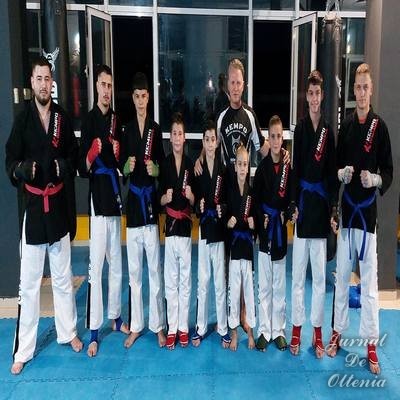
View On WordPress
#Buia Denis#Cojoaca Alexandru#Cupa Romaniei de Kempo K1#Enzo Minca#Federația Română de Kempo#ionut puca#Isuf Mihai#Luca Ghiga#Mario Florescu#power gym#Power Gym Craiova#Sandu Cristian#SCM Craiova
0 notes
Text
Alin Ionut Iancu : Daca eram la capacitate maxima, titlul venea acasa mult mai repede de 5 reprize!
Alin Ionut Iancu : Daca eram la capacitate maxima, titlul venea acasa mult mai repede de 5 reprize!
Alin Ionut Iancu si Ionut Puca au revenit din Germania unde Alin Ionut Iancu a luptat pentru titlul european WKU in cusca. A fost o perioada foarte incarcata . A participat la gala de box de la Timisoara, a mers la pregatire in Olanda, a participat la Campionatul National de Kempo iar acum a avut parte si de o premiera. In gala din Germania, Alin Ionut Iancu a avut parte de 6 reprize.. Am…
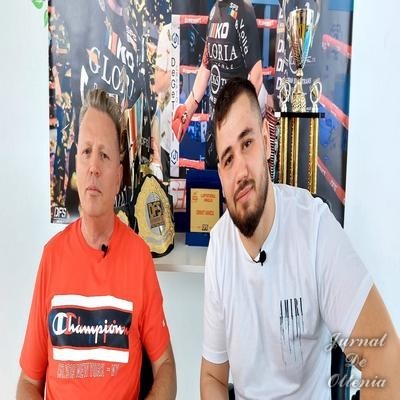
View On WordPress
#Alin Fălcușan#alin ionut iancu#box#Craiova#CRISTIAN SANDU#Germania#Golden Fighter Championship#Iancu Tancu#ionut puca#Kassel#KickBoxing#Mario Florescu#MMA#Phoenix Fight Gala#Powe Gym#SCM Craiova#Tanculet#Titlu European WKU#WKU
1 note
·
View note
Text
Concluziile lui Ionut Puca si ale sportivilor de la Scorpions Power Gym dupa primul turneu din 2022
Concluziile lui Ionut Puca si ale sportivilor de la Scorpions Power Gym dupa primul turneu din 2022
Alaturi de Ionut Puca ,sportivii de la Scorpions Power Gym Craiova au participat la UFT AMATEUR INTERNATIONAL TOURNAMENT 2 care a avut loc la Cluj Napoca pe 26 martie 2022, in Sala Sporturilor Horia Demian. Competitia a fost destinată tuturor luptătorilor amatori de arte martiale mixte – mma, kickboxing și grappling din România și din strainatate. Turneul a fost organizat sub egida Ministerului…

View On WordPress
#ALEX COJOACA#ALEX FECU#CATALIN CORNEA#CHIRITA ALEXANDRU#DENIS BUIA#DENIS MITRACHE#FLORIN CARSTEA#GABRIEL VASILE#Ionut Puca#kempo#kickbox#kickbox craiova#LUCA GHIGA#MARIO FLORESCU#MATEI RADU#MIHAI ISUF#SANDU STEFAN#SCORPIONS POWER GYM#Scorpions Power GYM Craiova#TRAILA ALBERTO#TRAILA RICARDO#UFT AMATEUR INTERNATIONAL TOURNAMENT 2
0 notes
Text
Craiova din nou la inaltime. Sandu Stefan Cristian si Florescu Mario, antrenati de Ionut Puca, au revenit cu 2 trofee..
Craiova din nou la inaltime. Sandu Stefan Cristian si Florescu Mario, antrenati de Ionut Puca, au revenit cu 2 trofee..
MFS Kids Promotion este un concept unic şi original în România, care a adus în ring pe cei mai talentaţi sportivi juniori din România, practicanţi de sporturi de contact, în care au fost puse la bătaie centuri de amatori, recunoscute de Organizaţii Internaţionale de profil, precum Organizaţia WKU şi Organizaţia XFC. Sustinatorul evenimentelor NFS este Alin Falcusan promotor Golden Fight…
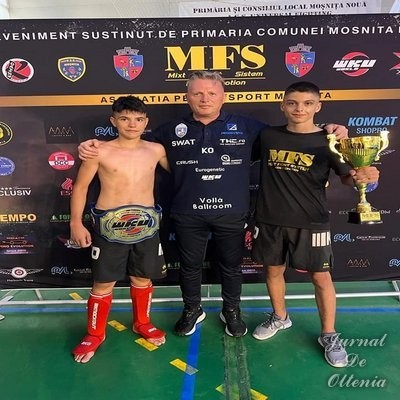
View On WordPress
#Alin Fălcușan#ciocoiu marius#Craiova#Federația Română de Kempo#florescu mario#ionut puca#kickbox#mfs kids promotion#mosnita noua#organizatia wku#organizatia xfc#sandu stefan cristian#WKU
0 notes
Text
CSO Filiasi a reluat pregatirile pentru noul sezon
CSO Filiasi a reluat pregatirile pentru noul sezon
Astazi pe stadionul Orasenesc a avut loc reunirea echipei CSO Filiasi. Mario Gaman, antrenorul echipei CSO Filiasi impreuna cu tot staful au condus primul antrenament . Florin Spinu, Presedintele echipei CSO Filiasi,a lucrat intens in ultima perioada astfel ca la primul antrenament au fost peste 30 de jucatori , o parte din acestia fiind in probe. In sezonul trecut CSO Filiasi a fost la cativa…
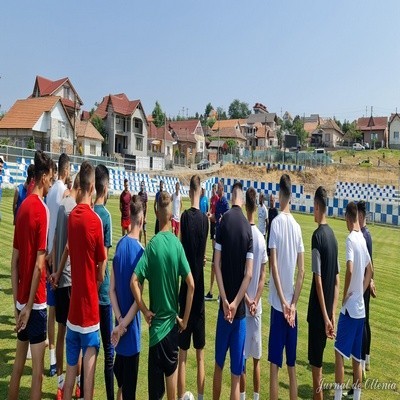
View On WordPress
#antrenor CSO Filiasi#costelus ilie gheorghe#CSO Filiasi#Florescu Laurentiu Ionel#Florin Spinu#Fotbal#Gheorghe Marin#liga 3#Mario Gaman#Presedinte CSO Filiasi#stadionul orasenesc
0 notes
Text
国际超现实主义十年展·葡萄牙
葡萄牙科英布拉,菲盖拉·达·福斯-国际超现实主义展览将于2020年4月24日至7月26日在葡萄牙菲盖拉·达·福斯市艺术与眼镜中心(CAE)开幕,本次展览是以庆祝和纪念10周年为宗旨,也是第14届“现在的国际超现实主义”展览。 该展览是由葡萄牙超现实主义艺术家 Santiago Ribeiro 先生创建的项目,始于2010年在科英布拉的Bissaya Barreto 基金会。 在这十年中,从里斯本到波尔图的全国各地巡回演出,以及美国的卫星展览,例如达拉斯,洛杉矶,密西西比大学和纽约,以及欧洲的柏林,巴黎和马德里 ,都是由 Santiago Ribeiro 先生一直在推广和组织。
该展览已成为全球21世纪最大的超现实主义展览,包括绘画,素描,数字艺术,雕塑和摄影作品。 来自52个国家/地区的124位参与者艺术家:阿尔巴尼亚,阿尔及利亚,阿根廷,澳大利亚,奥地利,阿塞拜疆,白俄罗斯,比利��,巴西,加拿大,智利,中国,哥伦比亚,克罗地亚,捷克共和国,古巴,丹麦,芬兰,法国,德国,匈牙利, 冰岛,印度尼西亚,伊朗,爱尔兰,以色列,意大利,日本,拉脱维亚,墨西哥,摩洛哥,荷兰,新西兰,尼日利亚,秘鲁,菲律宾,波兰,葡萄牙,罗马尼亚,俄罗斯,塞尔维亚,斯洛文尼亚,西班牙,瑞典,瑞士,土耳其 ,英国,美国,乌克兰,委内瑞拉,越南,印度。
Santiago Ribeiro 先生是21世纪全球最大的超现实主义展览的指导者和发起者,他已经在全世界包括柏林、莫斯科、纽约、达拉斯、洛杉矶、密西西比、华沙、圣彼得堡、南特、巴黎、伦敦、北京、佛罗伦萨、马德里、格拉纳达等地,以及巴塞罗那、里斯本、贝尔格莱德、黑山、罗马尼亚、日本、台湾、巴西、明斯克,新德里和卡塔吉隆在西西里和葡萄牙的许多城市,都有很多展览,目前正在南印第安纳大学的新和谐画廊展出他的艺术作品,并于1月底在丹佛举行的最大的数学会议上,在科罗拉多会议中心D厅举行的数字艺术展上展出他的艺术作品。
艺术和表演艺术中心(CAE)于2002年开放。大型文化建筑(2200座和800座礼堂-室外圆形剧场、门厅、会议室、工作室、4个展览厅),被认为是欧洲共同体基金的中心,通常举办大型国家和国际展览,同时还有其它活动。 http://cae.pt/
以下是艺术家的姓名:
Achraf Baznani, 摩洛哥 / Agim Meta, 阿尔巴尼亚-西班牙 / Aissa Mammasse, 阿尔及利亚 / Alessio Serpetti, 意大利 / Alvaro Mejias, 委內瑞拉 / Ana Neamu, 罗马尼亚 / Ana Pilar Morales, 西班牙 / Andrew Baines, 澳大利亚 / Asier Guerrero Rico (Dio), 西班牙 / Axel Blotevogel, 德国 / Brigid Marlin, 英国 / Bien Banez,菲律宾 / Can Emed, 土耳其 / Carlos Sablón, 古巴/ Cătălin Precup, 罗马尼亚 / 庄志辉, 中国台湾 / Cristian Townsend, 澳大利亚 / Conor Walton, 爱尔兰 / Cynthia Tom, 中国 / 美国 / Dag Samsund, 丹麦 / Daila Lupo, 意大利 / Dan Neamu,罗马尼亚 / Daniel Chiriac,罗马尼亚 / Daniel Hanequand, 法国 / 加拿大 / Daniele Gori, 意大利 / Delphine Cencig, 法国 / Dean Fleming, 美国 / Domen Lo, 斯洛文尼亚 / Edgar Invoker, 俄罗斯/ Efrat Cybulkiewicz, 委内瑞拉 / Egill Eibsen, 冰岛 / Erik Heyninck, 比利时 / Ettore Aldo Del Vigo, 意大利 / Fabrizio Riccardi, 意大利 / Farhad Jafari, 伊朗 / France Garrido, 美国 / Francisco Urbano, 葡萄牙 / Gabriele Esau,德国 / Genesis Cabrera, 美国 / Graça Bordalo Pinheiro, 葡萄牙 / Graszka Paulska, 波兰 / Gromyko Semper, 菲律宾 / Gyuri Lohmuller, 罗马尼亚 / Hector Pineda, 墨西哥 / Hector Toro, 哥伦比亚 / Henrietta Kozica,瑞典 / Hugues Gillet, 法国 / Isabel Meyrelles, 葡萄牙 / Iwasaki Nagi, 日本 / James Skelton, 英国/ Jay Garfinkle, 美国 / Jay Paul Vonkoffler,美国 / 阿根廷 / Jimah St, 尼日利亚 / Joanna Budzyńska-Sycz, 波兰 / João Duarte, 葡萄牙 / Keith Wigdor, 美国/ Leo Wijnhoven,荷兰 / Leo Plaw, 德国 / Liba WS, 法国 / Lubomír Štícha,捷克共和国 / Ludgero Rolo, 葡萄牙 / 吕上, 中国 / Maarten Vet, 荷兰 / Maciej Hoffman, 波兰 / Magi Calhoun, 美国 / Marnie Pitts, 英国 / Maria Aristova, 俄罗斯 / Mario Devcic,克罗地亚 / Martina Hoffman,德国 / Mathias Böhm, 德国 / Mehriban Efendi, 阿塞拜疆 / Naiker Roman, 古巴 / 西班牙 / Nazareno Stanislau, 巴西 / Nikolina Petolas, 克罗地亚 / Octavian Florescu, 加拿大 / Ofelia Hutul, 罗马尼亚 / Oleg Korolev, 俄罗斯 / Olesya Novik, 俄罗斯 / Olga Spiegel, 美国 / Otto Rapp, 奥地利 / Paula Rosa, 葡萄牙 / Paulo Cunha, 加拿大 / Pavlina Boroshova,瑞士-德国 / Pedro Diaz Cartes, 智利 / Penny Golledge, 英国 / Peter MC LANE, 法国 / Philippe Pelletier, 法国 / Radhika Menon,印度 / Richard Shannon, 美国 / Roch Fautch, 美国 / Rodica Miller, 美国 / Ruben Cukier, 阿根廷 /以色列 / Rudolf Boelee, 新西兰 / Russbelt Guerra,米鲁 / Sabina Nore, 奥地利 / Sampo Kaikkonen, 芬兰 / Santiago Ribeiro, 葡萄牙 / Sarah Zambiasi,澳大利亚 / Serge Sunne,拉脱维亚 / Sergey Tyukanov, 俄罗斯 / Shahla Rosa, 美国 / Shoji Tanaka, 日本 / 单竹兰, 中国 / Shia Weltenmenge, 德国 / Sio Shisio,印尼 / Slavko Krunic,塞尔维亚 / Sônia Menna Barreto, 巴西 / Steve Smith, 美国 / Stuart Griggs, 英国 / Svetlana Kislyachenko,乌克兰 / Svetlana Ratova, 俄罗斯 / Tatomir Pitariu, 美国 / Tersanszki Cornelia, 罗马尼亚 / Tim Roosen,比利时 / Ton Haring, 荷兰 / Victor Lages, 葡萄牙 / Vu Huyen Thuong, 越南 / Yamal Din, 摩洛哥 /西班牙/ 杨素敏, 中国台湾 / Yuliya Patotskaya, 白俄罗斯 / Yuri Tsvetaev, 俄罗斯 / Zoltan Ducsai,匈牙利 / Zoran Velimanovic, 塞尔维亚。
联络人:
Centro de Artes e Espectáculos Rua Abade Pedro
3080-084 Figueira da Foz 电话:233 407 200 传真:233 407 209 电子邮件: [email protected] 网站: www.cae.pt 时间: 周一至周四:上午9点至晚上11点 星期五:上午9点到午夜 星期六;上午10点到午夜 周日和节假日:10:00至19:00 演出天数:直到演出结束
from WordPress https://www.topicnews.cn/travel/guo-ji-chao-xian-shi-zhu via IFTTT
0 notes